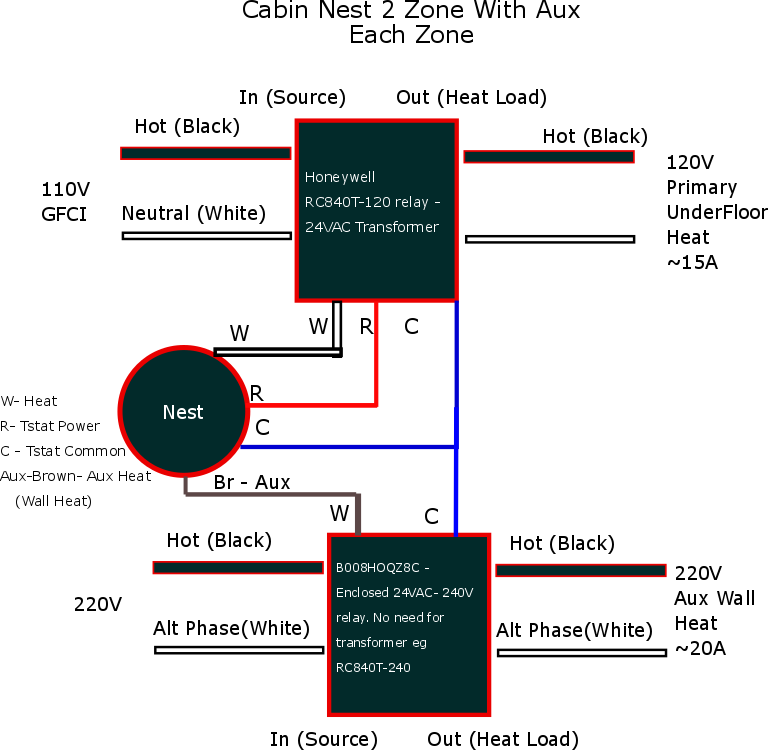Help with 240V heat relay

The house will only be occupied 1/2 the winter - and internet is available, so an app can tell the 2 nests to call for heat so the homeowner can turn up the heat on the way to the cabin. Each zone has UFH (under floor electric heat) and a 240V 20 amp in wall electric heater. The homeowner would prefer to only use the wall heater as supplemental aux heat if necessary. See diagram
1. The aux will need a 240 relay - no 24VAC transformer is necessary - which one(s) should I consider. Is there a reliable honeywell like RC840T-240 but without a transformer?
2. Am I missing something?

Comments
-
-
Rib has a few dry contact relays available that are self-powered, but a quick peek on my phone didn't show anything that was rated for 20 amps, and they don't provide power to run a thermostat either.
As @Zman mentioned above, a 24 volt transformer would make this problem go away and open you up to any kind of solution you felt was best.
-1 -
Great ideas- have the space and going with your suggestions.
For the transformer:
Packard PF42440 Control Transformer Class II Foot Mount 40VA 24V. Given that I am powering 2 nests, and 4 contactors (Packard C140A 1 Pole Contactor Coil Contactor, 40 Amp, 24V) , how many transformers will I need given each transformer is 40VA?
I assume the contactors are 24VAC even though they just say 24V?
Thanks again for all the help!
0 -
I couldn't find specs on the contactor you mentioned, but I found them for a comparable model. It says about 20 VA inrush & 5 VA holding. Depending on if/how you stage them, you're looking at 40 VA if they both draw in at once, or ((2 x 5VA) + 20) VA = 30 VA worst case if they come on one at a time. I'd suggest a 75VA xfrmr, it's better to not run right on the edge.
WRT the Nest stat, the specs only say that it's 1.21" deep, 3.3" tall, and also (can you believe it!) 3.3" wide. In any case the detailed specs tell me that it's 3rd generation, stainless, and has a 24 bit color display. Oh, and it uses less than 1 KWh/month. You're probably ok with ignoring the load of the nest stats. The internal battery should carry it through the times that the transformer is heavily loaded, if any.
0 -
If there is temporary not enough juice to engage the contactor, I presume the contactor won't fully move from the open to closed position, and it won't damage the contactor. After all it's just a spring and electric field.ratio said:I couldn't find specs on the contactor you mentioned, but I found them for a comparable model. It says about 20 VA inrush & 5 VA holding.
0 -
It not good at all for the contactor. Immediate failure isn't likely, but we depend on the magnetic loading of the pulled-in armature to control the current flow though the coil. I wouldn't consider anything less than a 50 VA transformer, & since they're right beside the 75's, which are only a few dollars more, I'd nearly certainly end up with a 75. Especially at a remote location.0
-
You got it! Ordered a 100 VA to handle both zones. I'll update the diagram when I get the chance! I got my fingers crossed.0
-
Here is the diagram with the updated hardware - someone suggested a fuse - what would that protect? The nest e? I contacted nest tech support and they had no idea what current the nest could support.ratio said:I wouldn't consider anything less than a 50 VA transformer ... I'd nearly certainly end up with a 75. Especially at a remote location.

0 -
A 100 VA transformer should have a built-in circuit breaker or fuse holder, pretty sure it's a code or listing requirement.
The Nests should be capable of switching those contactors, they appear to be pretty standard. The real question is how much current does the Nest need. They're not going to want to tell us that, because it changes pretty drastically. Idle current, i.e. nothing calling, will be less than one VA; however all the current required for the outputs needs to be accounted for in the total, as well as the charging current & (perhaps most significant) the power required when the radio transmits or receives. All those by rights should be added up & listed as "max power required" or some such, but that'd make it look like a small space heater, & since some of those are what's known as non-coincident (can't have heat & cool on at the same time for instance), they make it hard to find.
0
Categories
- All Categories
- 87.5K THE MAIN WALL
- 3.3K A-C, Heat Pumps & Refrigeration
- 61 Biomass
- 430 Carbon Monoxide Awareness
- 122 Chimneys & Flues
- 2.1K Domestic Hot Water
- 5.9K Gas Heating
- 117 Geothermal
- 170 Indoor-Air Quality
- 3.8K Oil Heating
- 78 Pipe Deterioration
- 1K Plumbing
- 6.6K Radiant Heating
- 395 Solar
- 15.9K Strictly Steam
- 3.5K Thermostats and Controls
- 57 Water Quality
- 51 Industry Classes
- 51 Job Opportunities
- 18 Recall Announcements
